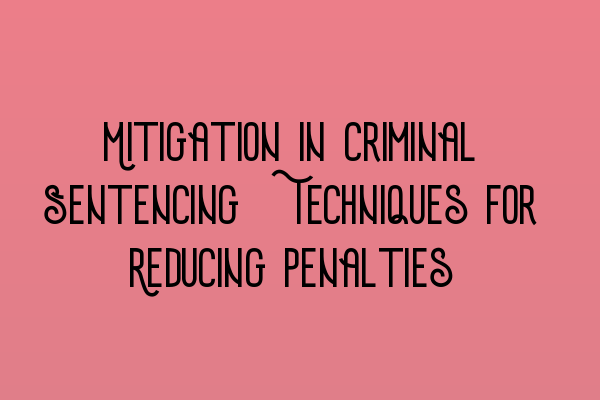Mitigation in Criminal Sentencing: Techniques for Reducing Penalties
When it comes to criminal sentencing, one crucial aspect that can significantly impact the outcome of a case is the art of mitigation. Mitigation refers to the process of presenting evidence and arguments to persuade the court to impose a lesser penalty or sentence. In this article, we will explore various techniques and strategies that can be employed by both solicitors and defendants to reduce penalties in criminal cases.
The Importance of Mitigation
Before delving into the techniques, it is important to highlight the significance of mitigation in criminal sentencing. The court takes into account various factors when determining a sentence, including the seriousness of the offense, the defendant’s role in the crime, and their previous criminal history. However, mitigation provides an opportunity to present factors that may justify a more lenient sentence.
In order to effectively argue for mitigation, it is vital to understand the specific circumstances of the case and the relevant legal framework. This is where the expertise of a solicitor specializing in criminal law becomes invaluable. If you require legal assistance or representation, it is recommended to consult a qualified professional from SQE 1 Preparation Courses‘; ?> who can guide you through the process and ensure that your mitigation efforts are conducted effectively.
Techniques for Mitigation
1. Presenting Personal Background: One common technique is to present a defendant’s personal background, including their education, employment history, and family circumstances. This helps the court to gain a better understanding of the individual and may elicit sympathy or understanding from the judge.
2. Expressing Remorse: Demonstrating genuine remorse for the offense committed is another powerful technique. Expressions of remorse can include a sincere apology, demonstrating an understanding of the impact of the offense on the victim or society, and taking steps towards rehabilitation or restitution.
3. Cooperation with Authorities: In some cases, cooperating with the authorities by providing information or assisting in the investigation can be used as a mitigating factor. This shows a willingness to take responsibility and can potentially lead to a more favorable outcome.
4. Rehabilitation Efforts: Evidence of proactive efforts towards rehabilitation can also be influential in mitigation. This can include attending counseling or therapy sessions, participating in community service, or enrolling in educational courses to improve oneself.
5. Mitigating Circumstances: Certain circumstances surrounding the offense may warrant a more lenient sentence. These could include coercion, duress, or other factors that may have influenced the defendant’s actions. It is crucial to gather evidence and present these circumstances effectively to the court.
Your Mitigation Strategy
Developing an effective mitigation strategy requires careful consideration of the specific details of the case and an understanding of how to present them persuasively. This is where the expertise of a solicitor specializing in criminal law plays a significant role. They can advise you on the most suitable techniques to employ and help you craft a compelling argument for mitigation.
If you are preparing for the SQE exams, it is essential to have a strong understanding of criminal law and practice. Practice questions and mocks can be invaluable tools in familiarizing yourself with the format and content of the exams. You can access SQE 1 Practice Exam Questions‘; ?> and SQE 1 Practice Mocks FLK1 FLK2‘; ?> for comprehensive preparation.
Conclusion
Mitigation plays a vital role in criminal sentencing, offering an opportunity for individuals to present compelling arguments that may result in reduced penalties. By employing techniques such as presenting personal background, expressing remorse, cooperating with authorities, demonstrating rehabilitation efforts, and highlighting mitigating circumstances, the chances of achieving a more favorable sentence can be significantly increased. However, it is crucial to seek legal advice from a qualified solicitor to ensure your mitigation efforts are conducted effectively.
If you are looking for SQE exam preparation courses, including SQE 2 Preparation Courses‘; ?> and SQE 1 Preparation Courses‘; ?>, feel free to visit our website for more information. Additionally, you can check SRA SQE Exam Dates‘; ?> to plan your study schedule effectively.
